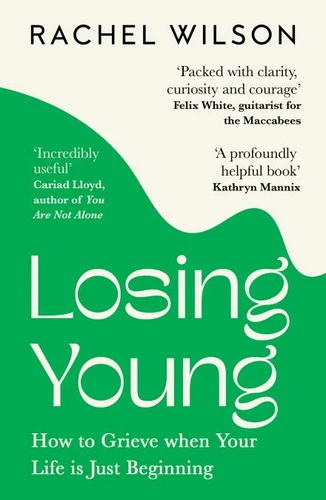Losing Young. How to Grieve When Your Life is Just Beginning
Par :Formats :
Disponible dans votre compte client Decitre ou Furet du Nord dès validation de votre commande. Le format ePub protégé est :
- Compatible avec une lecture sur My Vivlio (smartphone, tablette, ordinateur)
- Compatible avec une lecture sur liseuses Vivlio
- Pour les liseuses autres que Vivlio, vous devez utiliser le logiciel Adobe Digital Edition. Non compatible avec la lecture sur les liseuses Kindle, Remarkable et Sony
- Non compatible avec un achat hors France métropolitaine
 , qui est-ce ?
, qui est-ce ?Notre partenaire de plateforme de lecture numérique où vous retrouverez l'ensemble de vos ebooks gratuitement
Pour en savoir plus sur nos ebooks, consultez notre aide en ligne ici
- Nombre de pages240
- FormatePub
- ISBN978-0-00-850234-8
- EAN9780008502348
- Date de parution17/08/2023
- Protection num.Adobe DRM
- Infos supplémentairesepub
- ÉditeurWilliam Collins
Résumé
'An incredibly useful take on facing grief as a young person' CARIAD LLOYD
'Brilliantly, brilliantly written . Packed with clarity, curiosity and courage' FELIX WHITE
'It turned on so many lights for me . What a profoundly helpful book' KATHRYN MANNIX
Grief does something particular when it hits you young. This book is a moving exploration of that transformative pain, from the founder of The Grief Network.
Rachel Wilson's mother died when Rachel was in her twenties.
It felt like the definitive end of childhood, a loss that rewired her perspective on life, death, relationships and who she was as a person. In this book, Rachel brings together other stories of bereavement with her own, encountering people who have lost parents, siblings, partners and friends at a young age. Losing Young draws on psychological research, interviews with titans like Julia Samuel and explorations of grief in history: what happens in a time of war or pandemic, when the many grieve - or struggle to - together? How do different cultures process the end of a life differently? How can the grief of losing a parent return in strange form when one thinks about having children? What do TV and fiction get disastrously, unhelpfully wrong? This is a personal and profound book about what happens when youth is reshaped by tragedy, trauma and loss.
It's for anyone who mourns a lost future, who is struggling to find themselves after grief, or hopes to feel less alone.
It felt like the definitive end of childhood, a loss that rewired her perspective on life, death, relationships and who she was as a person. In this book, Rachel brings together other stories of bereavement with her own, encountering people who have lost parents, siblings, partners and friends at a young age. Losing Young draws on psychological research, interviews with titans like Julia Samuel and explorations of grief in history: what happens in a time of war or pandemic, when the many grieve - or struggle to - together? How do different cultures process the end of a life differently? How can the grief of losing a parent return in strange form when one thinks about having children? What do TV and fiction get disastrously, unhelpfully wrong? This is a personal and profound book about what happens when youth is reshaped by tragedy, trauma and loss.
It's for anyone who mourns a lost future, who is struggling to find themselves after grief, or hopes to feel less alone.
'An incredibly useful take on facing grief as a young person' CARIAD LLOYD
'Brilliantly, brilliantly written . Packed with clarity, curiosity and courage' FELIX WHITE
'It turned on so many lights for me . What a profoundly helpful book' KATHRYN MANNIX
Grief does something particular when it hits you young. This book is a moving exploration of that transformative pain, from the founder of The Grief Network.
Rachel Wilson's mother died when Rachel was in her twenties.
It felt like the definitive end of childhood, a loss that rewired her perspective on life, death, relationships and who she was as a person. In this book, Rachel brings together other stories of bereavement with her own, encountering people who have lost parents, siblings, partners and friends at a young age. Losing Young draws on psychological research, interviews with titans like Julia Samuel and explorations of grief in history: what happens in a time of war or pandemic, when the many grieve - or struggle to - together? How do different cultures process the end of a life differently? How can the grief of losing a parent return in strange form when one thinks about having children? What do TV and fiction get disastrously, unhelpfully wrong? This is a personal and profound book about what happens when youth is reshaped by tragedy, trauma and loss.
It's for anyone who mourns a lost future, who is struggling to find themselves after grief, or hopes to feel less alone.
It felt like the definitive end of childhood, a loss that rewired her perspective on life, death, relationships and who she was as a person. In this book, Rachel brings together other stories of bereavement with her own, encountering people who have lost parents, siblings, partners and friends at a young age. Losing Young draws on psychological research, interviews with titans like Julia Samuel and explorations of grief in history: what happens in a time of war or pandemic, when the many grieve - or struggle to - together? How do different cultures process the end of a life differently? How can the grief of losing a parent return in strange form when one thinks about having children? What do TV and fiction get disastrously, unhelpfully wrong? This is a personal and profound book about what happens when youth is reshaped by tragedy, trauma and loss.
It's for anyone who mourns a lost future, who is struggling to find themselves after grief, or hopes to feel less alone.



